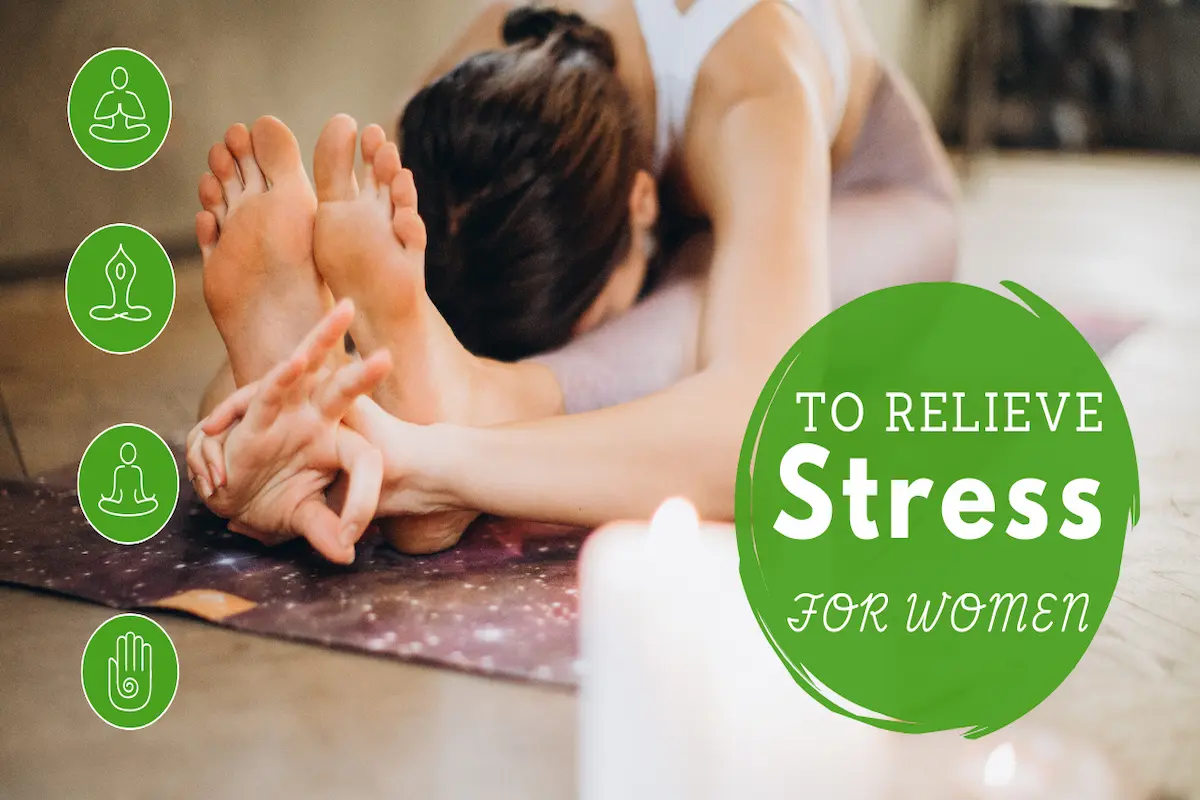How to Instantly Relieve Stress for a Woman
How to Instantly Relieve Stress for a Woman
In today’s fast-paced world, finding ways of instantly relieve stress is crucial for women who juggle multiple roles—whether as professionals, mothers, partners, or caregivers. These responsibilities can create a heavy burden, leading to stress that affects both mental and physical well-being. Studies show that women are more likely to report higher levels of stress than men, often due to the combined pressures of work, family, and societal expectations. Therefore, adopting effective stress exercises and techniques is crucial for maintaining balance and good health.
This article explores common stress causes, warning signs, and expert-backed methods on how to instantly relieve stress for a woman. By implementing these stress exercises and relaxation strategies, women can enhance their emotional resilience and lead a more fulfilling life.
Understanding the Causes of Stress in Women
Stress comes in many forms, and women often experience it from multiple sources simultaneously. Knowing the root causes of stress can be the first step in managing it effectively.
-
Work-life Balance
- Many women struggle to balance their careers with personal and family obligations. Whether managing a demanding job, caring for children, or handling household duties, the constant need to “do it all” can lead to overwhelming stress.
-
Family Responsibilities
- Women often take on the role of the primary caregiver in families, whether for children, aging parents, or both. This added responsibility, combined with other daily tasks, can result in emotional burnout.
-
Social Expectations and Body Image
- Society places unique pressures on women regarding appearance, behavior, and success. These expectations can create anxiety, especially around body image and social acceptance.
-
Hormonal Changes
- Hormonal fluctuations during menstruation, pregnancy, and menopause can have a profound impact on stress levels. Many women experience heightened emotional sensitivity during these periods, leading to increased stress.
-
Financial Pressures
- Women often face financial stress due to the gender pay gap, career interruptions, and the rising costs of living. Managing personal or family finances can create additional pressure.
-
Work-life Balance
- Many women struggle to balance their careers with personal and family obligations. Whether managing a demanding job, caring for children, or handling household duties, the constant need to “do it all” can lead to overwhelming stress.
-
Family Responsibilities
- Women often take on the role of the primary caregiver in families, whether for children, aging parents, or both. This added responsibility, combined with other daily tasks, can result in emotional burnout.
-
Social Expectations and Body Image
- Society places immense pressure on women regarding their appearance and success. These unrealistic expectations often lead to anxiety. Implementing stress exercises like deep breathing and meditation can help manage these emotions.
-
Hormonal Changes
- Hormonal fluctuations during menstruation, pregnancy, and menopause can have a profound impact on stress levels. Many women experience heightened emotional sensitivity during these periods, leading to increased stress.
-
Financial Pressures
- Women often face financial stress due to the gender pay gap, career interruptions, and the rising costs of living. Managing personal or family finances can create additional pressure.
Understanding the cause of stress is critical because it allows you to address it at the source. From there, specific strategies can be implemented to manage and relieve stress effectively.
Signs You’re Experiencing Stress
Recognizing the signs of stress is vital. While it’s natural to feel stress from time to time, chronic stress can lead to significant health issues if left unchecked. Here are some common symptoms that may indicate you’re experiencing stress:
-
Physical Symptoms
- Headaches or migraines
- Muscle tension, especially in the neck, shoulders, and back
- Fatigue or low energy levels
- Gastrointestinal issues, such as stomach aches or digestive problems
-
Emotional Symptoms
- Feelings of anxiety, worry, or panic
- Mood swings or irritability
- Depression or sadness
- Feelings of being overwhelmed or out of control
-
Behavioral Changes
- Changes in eating habits (overeating or undereating)
- Difficulty sleeping or insomnia
- Increased use of alcohol, caffeine, or other substances
- Avoiding responsibilities or procrastination
If any of these symptoms sound familiar, it may be time to take a step back and explore how to relieve the stress that’s taking a toll on your health.
Effective Stress-Relief Techniques
The good news is that there are many proven ways to relieve stress. Below are some techniques that can help manage stress effectively, providing both short-term relief and long-term benefits.
Mindfulness and Meditation
Benefits of Daily Meditation Practice
Mindfulness and meditation are excellent tools for reducing stress. Mindfulness involves being fully present in the moment, which can help break the cycle of stress-inducing thoughts about the past or future. Studies have shown that regular meditation can reduce the body’s stress hormone, cortisol, and improve overall mental health.
How to Practice Mindfulness Throughout the Day
Mindfulness doesn’t have to be restricted to formal meditation sessions. Try practicing it throughout your day by focusing on your breath, taking short pauses to center yourself, or fully engaging with a current task. This could be as simple as being present while sipping your morning coffee or enjoying a walk outside without distractions.
Guided Breathing Exercises for Immediate Stress Relief
When stress hits hard, guided breathing exercises can provide immediate relief. Try the 4-7-8 breathing technique:
- Inhale through your nose for 4 seconds.
- Hold your breath for 7 seconds.
- Exhale slowly for 8 seconds.
Repeat this process 3-4 times for a quick way to calm your body and mind.
Exercise and Movement
The Role of Physical Activity in Reducing Stress Hormones
Physical activity is one of the most effective ways to combat stress. When you exercise, your body releases endorphins—natural chemicals that improve mood and reduce pain perception. Exercise also lowers the production of cortisol, the body’s primary stress hormone.
Stress exercises: Yoga, Walking, Stretching
You don’t need an intense workout to relieve stress. Gentle activities like yoga, walking, or stretching can help reduce muscle tension and promote relaxation. Yoga, in particular, combines movement with mindfulness and deep breathing, making it a holistic approach to stress relief.
Dance or Fun Physical Activities to Boost Mood
Engaging in fun, playful activities like dancing can also boost your mood. Don’t underestimate the power of dancing in your living room to your favorite song—it’s a fun way to break free from stress and feel good about yourself.
Healthy Eating for Stress Management
Nutrients That Help Fight Stress
The foods you eat can have a direct impact on how you feel. Certain nutrients are known to help the body manage stress more effectively, including:
- Omega-3 fatty acids: Found in fish like salmon, these can help reduce inflammation and stress.
- Magnesium: Known for its calming effects, magnesium can be found in leafy greens, nuts, and seeds.
- B vitamins: These support brain health and can improve mood. Whole grains, eggs, and legumes are rich in B vitamins.
Foods to Include and Avoid for Stress Relief
To reduce stress, prioritize a diet rich in whole foods like vegetables, fruits, lean proteins, and healthy fats. On the flip side, avoid excess caffeine, sugar, and processed foods, which can lead to energy crashes and mood swings.
Meal Planning Tips to Reduce Stress Around Cooking
Preparing meals ahead of time can reduce the stress of last-minute cooking. Meal prep can be as simple as chopping vegetables, cooking grains, or marinating proteins in advance. This makes it easier to put together a nutritious meal when you’re pressed for time.
How a Stress-Free Diet Improve Gut Health
Managing stress through diet not only improves mental well-being but also plays a crucial role in gut health. Stress can disrupt the balance of gut bacteria, leading to digestive issues like bloating, indigestion, and inflammation. Nutrient-rich foods such as fiber, probiotics (yogurt, kefir, sauerkraut), and omega-3s help strengthen the gut microbiome, improving digestion and overall health. By avoiding processed foods and focusing on whole, stress-relieving meals, you create a healthier gut environment that supports both mood and digestion.
Building a Support System
Importance of Having a Strong Social Circle
Humans are social creatures, and having a strong support system can make a big difference in how you handle stress. Friends, family, and colleagues can provide emotional support, advice, or simply a listening ear when you’re feeling overwhelmed.
How to Communicate Stress Effectively to Loved Ones
It’s important to communicate your stress to those around you. Be open with your loved ones about how you’re feeling, and don’t be afraid to ask for help when you need it. Whether it’s a friend helping with a task or simply talking about your day, sharing your stress can lighten the emotional load.
Seeking Professional Help When Needed
Sometimes, stress can become too much to handle on your own. Don’t hesitate to seek professional help from a counselor or therapist if you’re feeling overwhelmed. Therapy can provide valuable tools for managing stress and improving your mental health.
Sleep and Relaxation Techniques
Creating a Bedtime Routine to Improve Sleep Quality
Sleep is essential for stress management, but stress often leads to poor sleep quality. Create a calming bedtime routine by avoiding screens, caffeine, and large meals close to bedtime. Instead, opt for relaxing activities like reading, taking a warm bath, or practicing deep breathing.
Benefits of Power Naps
If you find yourself fatigued during the day, short power naps (15-30 minutes) can help you recharge without affecting your nighttime sleep.
Relaxation Techniques: Progressive Muscle Relaxation and Aromatherapy
Progressive muscle relaxation involves tensing and relaxing different muscle groups in the body, which can help reduce physical tension. Aromatherapy with calming scents like lavender, chamomile, or sandalwood can also help create a relaxing environment.
Practical Tips for Balancing Daily Life
Time Management and Prioritization
Managing time effectively is key to reducing stress. Prioritize tasks by importance, and focus on what truly matters each day. Break larger tasks into smaller, manageable steps to avoid feeling overwhelmed.
Setting Boundaries at Work and in Personal Life
Setting clear boundaries is essential to prevent burnout. Whether at work or in personal relationships, make sure you’re not overextending yourself. This might mean saying no to extra work or carving out time for self-care.
Learning to Say No and Avoid Overcommitting
Saying no can be difficult, but it’s a vital skill for managing stress. If your schedule is already full, declining additional commitments can help protect your mental and emotional energy.
Hormonal Stress Management
Understanding the Impact of Hormonal Changes on Stress Levels
Hormonal fluctuations during menstruation, pregnancy, and menopause can affect mood and stress levels. These changes can sometimes make women more prone to stress or anxiety during certain phases of their life.
Managing Stress During Menstruation, Pregnancy, and Menopause
Recognizing how hormones affect your body can help you manage stress better. For example, during menstruation, it’s helpful to focus on gentle self-care, such as rest, hydration, and soothing activities. During pregnancy and menopause, maintaining a healthy diet, exercising, and seeking emotional support are important.
Self-Care Practices for Hormonal Balance
Hormonal balance is crucial for reducing stress. Practices like maintaining a balanced diet, exercising regularly, and ensuring adequate sleep can help regulate hormones and minimize stress-related symptoms.
How to Instantly Relieve Stress For Woman
Stress is an unavoidable part of life, but for women managing careers, family, and personal responsibilities, it can quickly become overwhelming. To instantly relieve stress, it’s essential to adopt quick and effective relaxation techniques that fit seamlessly into a busy lifestyle. Simple practices like deep breathing exercises, short meditation sessions, physical movement, and self-care rituals can work wonders in reducing stress levels. Additionally, maintaining a healthy diet, staying hydrated, and ensuring quality sleep are crucial for overall well-being. By incorporating these stress-relief strategies, women can regain control, boost mental clarity, and enhance their emotional resilience. Prioritizing self-care isn’t a luxury—it’s a necessity for living a balanced and fulfilling life.
Self-Care Practices for Women
The Importance of ‘Me-Time’ and How to Schedule It
Carving out personal time is essential for mental and emotional health. Set aside time each day to engage in activities that make you feel happy, relaxed, and recharged. This could be anything from taking a walk, reading a book, or enjoying a hobby.
Activities That Promote Self-Care: Journaling, Spa Days, Hobbies
Self-care doesn’t have to be expensive or time-consuming. Simple activities like journaling can help process emotions, while at-home spa days or pursuing hobbies can provide a much-needed break from daily stresses.
Digital Detox: Reducing Stress from Social Media and Technology
Constant connectivity through social media and technology can exacerbate stress. Taking regular breaks from your phone and social media can help you reconnect with yourself and reduce the anxiety that comes with constant online engagement.
Conclusion
Stress is a natural part of life, but it doesn’t have to control you. By understanding the unique causes of stress in women and employing effective stress-relief techniques, you can regain balance and prioritize your well-being. Whether it’s through mindfulness, exercise, self-care, or building a support system, managing stress is about making small, consistent changes that promote mental and physical health. Start with one or two strategies that resonate with you and build from there. Remember, prioritizing your health and happiness is not just beneficial for you—it also improves your ability to care for others and thrive in all areas of life.



